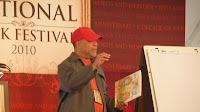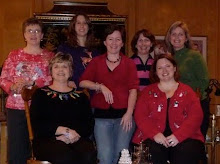
Voice:
The words you choose.
It’s tone.
It’s mood.
It’s the way you structure.
You just know it when you see it, when you hear it.
I’ve heard writers, agents, and editors all try to explain this elusive concept of voice in writing.
At the National Book Festival last Saturday, I had the privilege to hear a presentation by one of the world’s best-loved illustrators, Jerry Pinkney. He stood up to speak late in the afternoon, when the tired crowds had thinned, but die-hard fans remained. He talked about his childhood, and the hours he spent with a sketchbook in his hand.
And then he answered a young girl's question.
“Mr. Pinkney, how do you draw pictures, so that they look like yours and not someone else’s?”
He paused a minute, considering.
“What I think you are asking about is called style,” he said. “But style is not how I draw. Style is how I see the world.”
Surely Mr. Pinkney’s simple description tells us something important about every creative discipline, including that intangible idea of writer’s voice.
We practice and practice to master the writer’s craft, until it becomes a natural extension of who we are.
And if we are brave enough, we are finally able to say something of our own unique experience, something someone else is longing to hear.










